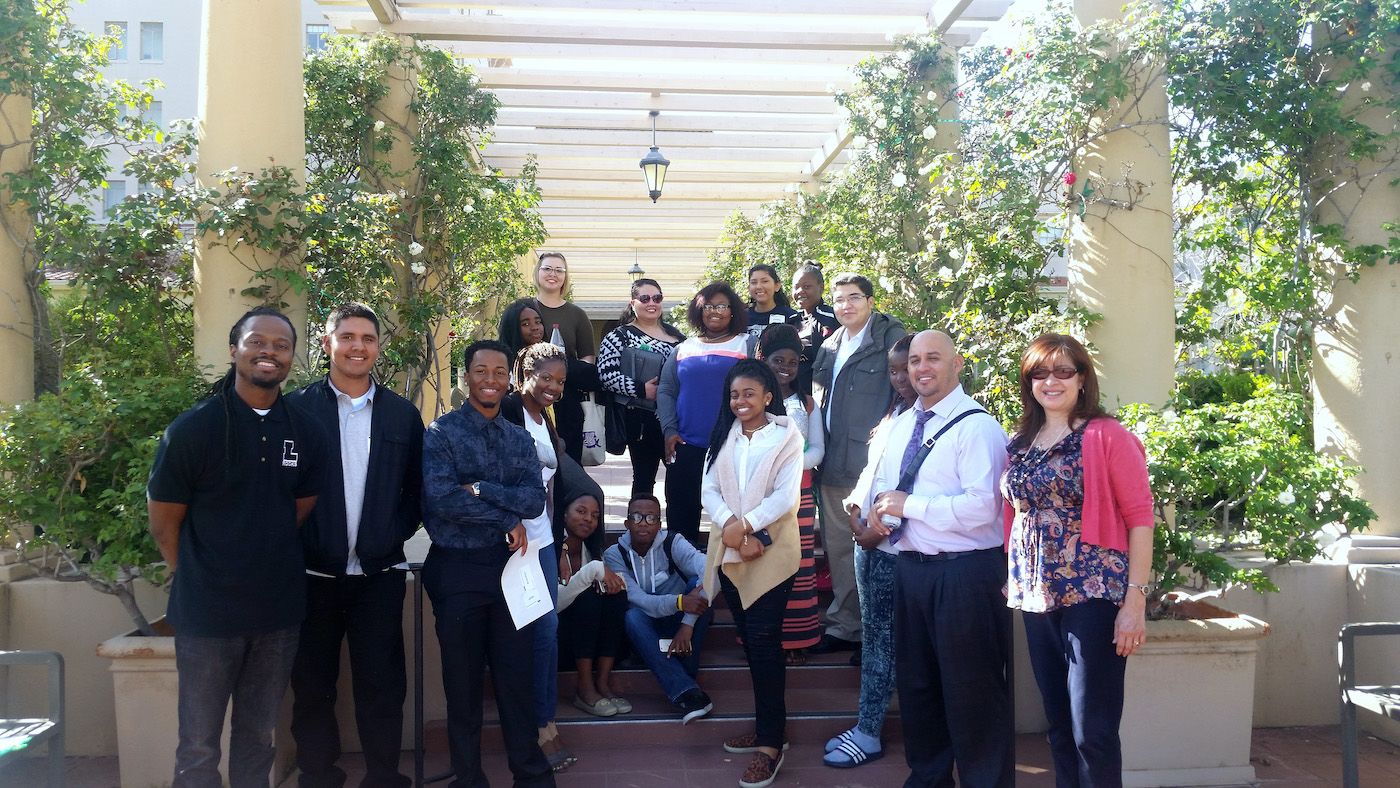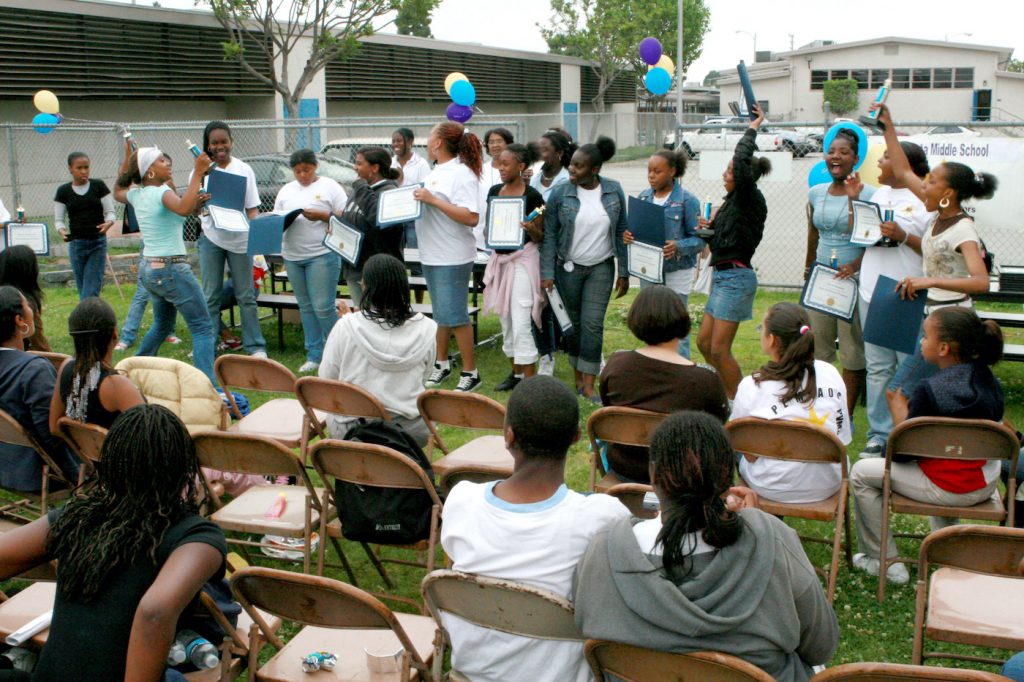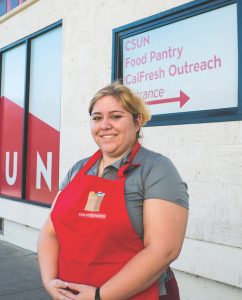Disrupting the School-to-Prison Pipeline

When Jessica Ellis explains why she works at Centinela Youth Services (CYS), she can’t shake the memory of an 11-year-old boy who was facing school expulsion. The boy was accused of “sexual assault” for twerking at a middle school dance.
“This damaging label would be on his permanent educational record if CYS had not intervened,” Ellis, the nonprofit’s executive director, says. Through CYS’s Everychild Restorative Justice Center division, CYS and partners were able to get the case dropped.
“This boy was in foster care and had experienced a lot of trauma that was expressed in disruptive behaviors,” Ellis says. “He was just placed with his elderly grandmother and hadn’t yet received any support for all the trauma he’d experienced. We advocate to ensure children receive appropriate treatment rather than unnecessary criminalization.”
At the heart of CYS’s work is the goal to create spaces for honest and sometimes uncomfortable conversations to occur in the form of Restorative Justice sessions. Trained community volunteers facilitate restorative agreements between young people and the victims they have harmed. Each young person chooses to take responsibility for their actions and finds ways to make things right directly to those impacted. The idea is to create empathy and understanding between the young people and those they hurt, to rebuild relationships and restore communities.

“This creates meaningful accountability while improving public safety,” Ellis says. “Our work interrupts the legal trajectory of the young person’s case in exchange for making things right directly with the victim, leading to lower recidivism and higher victim satisfaction. We put justice back into the hands of the community.”
Studies have found that any engagement with the punitive justice system can create lifelong negative impacts on teens and increases the chances of further crime. Established in 1983, CYS focuses special attention on outreach in low-income communities of color, which have experienced racial bias in the justice system for decades, providing opportunities to interrupt the arrest process with more effective services. Black youths now account for a third of arrested juveniles in Los Angeles, nearly double the percentage a decade ago, according to LAPD arrest data. They make up just 9% of L.A. County’s population.
Working directly with police departments across Los Angeles County, CYS regularly receives referrals from officers who now recognize most youth crimes can be handled more effectively outside of the courtroom. The nonprofit offers police training, family conflict mediation, and skilling up community volunteers to facilitate restorative justice and family conflict mediations.
The results speak for themselves. For example, prior to 2015, nearly 200 students in the Compton Unified School District were arrested annually. Through training and relationship building with the district’s police department, principals, and teachers, CYS helped drop student arrests by 95% to just 11 in 2019. One of the main strategies CYS employs to help ensure young people thrive is to support law enforcement and schools to shift from harmful punitive practices toward those rooted in the latest brain science on adolescent development.
Beyond its life-changing work with young people and those impacted by youth crime, CYS is dedicated to driving policies that end the practice of locking kids up unnecessarily when more effective options are available, an effort, Ellis says, requires addressing systemic policies and practices that drive inequity.
“Our society has been waking up to system inequities and the biggest problem we see is over-criminalization of youth of color in under-resourced communities,” Ellis says. “Our youth face the frequent prospect of suspensions or arrest when youth in wealthier communities are offered counseling for comparable behaviors. We must invest in the success of ALL of our youth.”
Centinela Youth Services
Donate now!www.cys-la.org
(310) 970-7785
Executive Director: Jessica J. Ellis
Mission
Centinela Youth Services strengthens families and communities and helps build successful students and productive adults, leveraging the principles of restorative justice to empower peaceful conflict resolution. We are committed to ending the institutionalized practices in schools and justice systems that are primarily responsible for maintaining the school-to-prison pipeline, and disproportionately impact youth of color.
Begin to Build a Relationship
We know you care about where your money goes and how it is used. Connect with this organization’s leadership in order to begin to build this important relationship. Your email will be sent directly to this organization’s director of development and/or Executive Director.
The current punitive justice system doesn’t work, so we have to figure out a way to stop the cycle. We cannot continue to lock kids up and throw them away like they don’t matter.
Become a Champion for Change
Centinela Youth Services has a long-term vision to ensure all youths have an equal opportunity to thrive and become contributing members of their communities.
“True change, focused on equity, takes sustainable, predictable revenue and committed champions,” says Executive Director Jessica Ellis. Through 2022, CYS will be growing its Champions for Change Circle – C3.
Donors who commit to three years of giving at least $1,000 annually have the opportunity to hear directly from impacted families, learn about system equity issues and help advise on CYS’s policy change efforts. Contributors will help CYS reach more young people, going beyond the 2,500 it already serves each year.
Ellis says it’s not enough to simply provide direct services to families in need if the organization isn’t simultaneously addressing the systemic causes that drove the need in the first place: “We’d like to give our supporters more of a window on these often-unseen forces at work.”
Key Supporters
Ahmanson Foundation
Ballmer Group
Black Equity Initiative
California Board of State
and Community Corrections
California Community Foundation
Annie E. Casey Foundation
Winona Dorris
Michael Douglass
Everychild Foundation
Goodwin Family Foundation
Dr. Mark Henderson
L.A. County
Ralph M. Parsons Foundation
Robert Pullen-Miles
Danielle Sevilla
Bernadette Suárez
Union Bank
Olivia Valentine
Weingart Foundation
